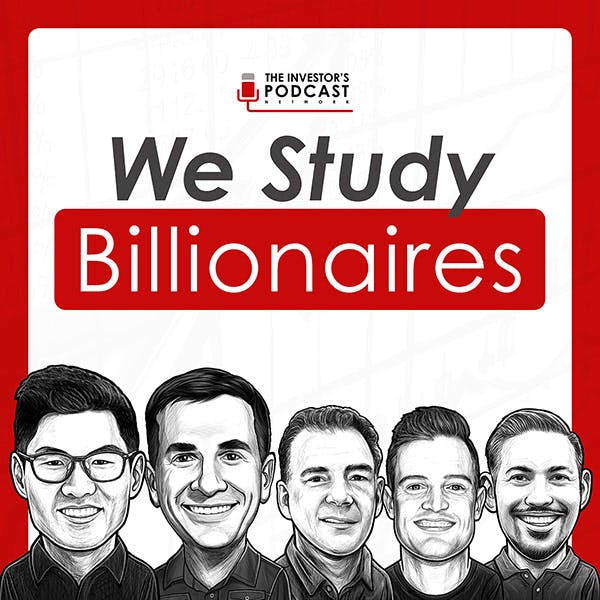
Yesterday • 1hr 29min
TIP685: Top Takeaways From 2024 w/ Kyle Grieve & Clay Finck
We Study Billionaires - The Investor’s Podcast Network

Key Takeaways
- Focus and Signal vs. Noise - Successful investors need to guard their attention carefully and focus on what truly matters while filtering out market noise
- Base Rates of Stock Success - Only about 4% of stocks account for all net wealth creation in the market historically
- Feedback Loops - Long-term investors should establish clear feedback loops to evaluate investment theses, even if final outcomes take years
- Business Impermanence - Even seemingly impenetrable businesses can fail if they become complacent and lose their competitive edge
- Three Sources of Returns - Stock returns come from earnings growth, multiple expansion/contraction, and capital returns to shareholders
- Trustworthiness and Reliability - Being trustworthy and reliable are critical traits for both personal and professional success
Introduction
In this episode, host Kyle Grieve is joined by co-host Clay Finck to discuss and summarize key investing lessons learned in 2024. The episode features clips and insights from various guests throughout the year, including Chris Mayer, Hendrik Bessembinder, Brian Lawrence, Morgan Housel, John Huber, Annie Duke, and Mohnish Pabrai. The discussion covers critical topics like focusing on what matters, understanding base rates of success, seeking disconfirming evidence, and maintaining trustworthiness.
Topics Discussed
Focus and Avoiding Market Noise (03:11)
Chris Mayer discusses the importance of distinguishing signal from noise in investing. He emphasizes:
- Avoiding macro predictions and guesswork that don't impact long-term business performance
- Focusing attention on understanding individual businesses and meeting with management
- Developing habits that prevent constant price checking and market monitoring
- Identifying critical success factors that will matter over a 10-year horizon
Base Rates of Stock Market Success (09:19)
Professor Hendrik Bessembinder shares findings from his research on long-term stock market returns:
- Only 4% of stocks account for all net wealth creation in the US stock market since 1926
- Majority of stocks (4 out of 7) underperform Treasury bills
- Top 90 companies account for over half of the $35 trillion in wealth creation
- Skewness is pervasive across different asset classes, similar to venture capital returns
Seeking Disconfirming Evidence (25:42)
Brian Lawrence discusses the importance of actively seeking out disconfirming evidence:
- Embracing challenges to investment theses rather than avoiding them
- Learning from mistakes - being right 70% of the time means being wrong 30%
- Studying short sellers and opposing viewpoints to strengthen analysis
- Using periods of underperformance as opportunities for intense learning
Business Impermanence (29:46)
Morgan Housel discusses why competitive advantages often fail:
- 40% of public companies lost all their value between 1980-2014
- Success can breed complacency and cause companies to lose their competitive edge
- Examples like Sears show how even dominant companies can fail
- Successful companies like Nvidia maintain success by staying paranoid about competition
Three Sources of Investment Returns (33:00)
John Huber outlines the three fundamental drivers of stock returns:
- Earnings growth - organic business expansion
- Multiple expansion/contraction - changes in valuation
- Capital returns - dividends and share buybacks
- Importance of entry price - paying too much can negate good business performance
Closing Feedback Loops (50:52)
Annie Duke discusses how long-term investors can establish effective feedback loops:
- Track objective metrics that indicate thesis progress
- Monitor execution against specific predictions
- Update views based on new information (Bayesian analysis)
- Don't wait for final outcomes to evaluate decision quality
Cone of Uncertainty (1:00:29)
Kyle discusses Nick Sleep and Zak Zakaria's concept of the cone of uncertainty:
- Uncertainty decreases as understanding of business increases
- Position sizing can increase as certainty grows
- Monitor whether uncertainty cone is expanding or contracting
- Use framework to maintain conviction in best ideas
Trustworthiness and Reliability (1:07:00)
Mohnish Pabrai discusses core principles for success:
- Reliability and trustworthiness are fundamental to long-term success
- Short-term convenience often compromises long-term reputation
- Building trust takes time but creates lasting advantages
- Basic principles like honesty and fairness matter most
Conclusion
The episode synthesizes valuable lessons from multiple successful investors and thinkers. Key themes include the importance of focus and avoiding noise, understanding the challenging odds of stock picking success, actively seeking disconfirming evidence, recognizing business impermanence, understanding return drivers, establishing feedback loops, and maintaining trustworthiness. These lessons provide a framework for both investment success and personal development.
The hosts emphasize the value of the TIP Mastermind Community and the quality of their audience, highlighting how surrounding oneself with high-quality people can lead to better decision-making and personal growth. They encourage listeners to find ways to connect with others who can help them improve and grow.









